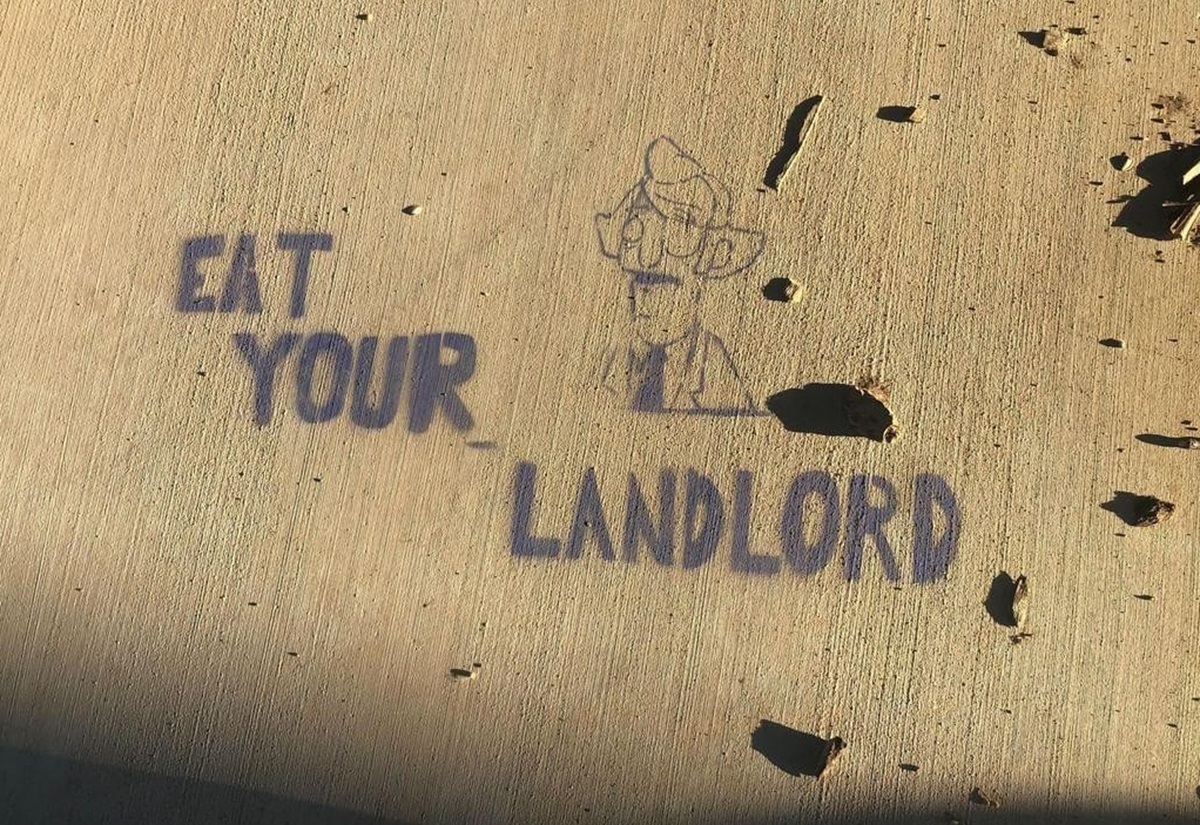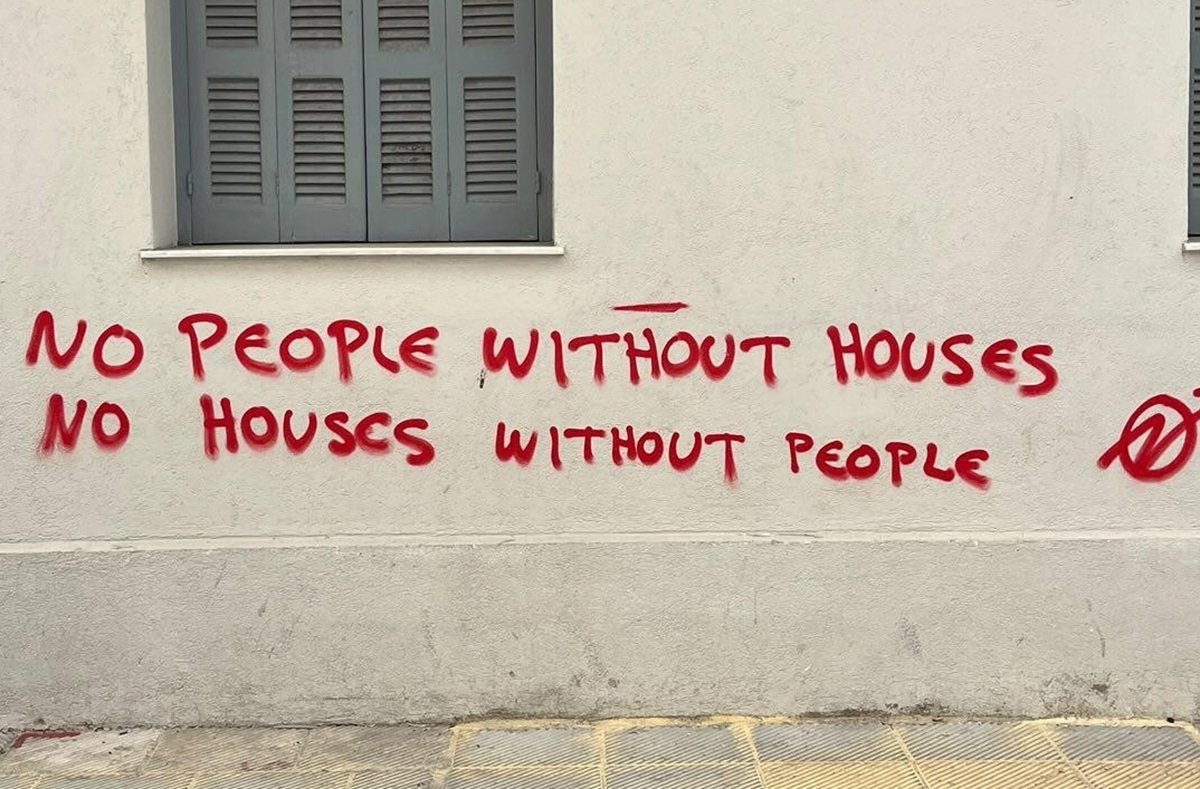Filed under: Featured, Housing, Interviews, US

During the recent election cycle, politicians from both parties have attempted to shift anger around gentrification, rising rental costs, and lack of access to affordable housing onto hatred of houseless people and immigrant workers. During the recent Vice Presidential debate, far-Right Christian Nationalist JD Vance, pushed the racist lie that immigrant workers are the cause of high rents. This follows months of the Trump campaign amplifying conspiracy theories originally circulated by neo-Nazi and white supremacist groups about Haitian workers in cities like Springfield, OH.
As The Intercept recently reported:
Vance’s claims are “baseless,” said Alia Trindle, director of political strategy for Right to the City Action, the electoral arm of Right to the City Alliance, a national network of 74 housing, racial, and economic justice organizations.
Issues like a lack of affordable housing supply and other longstanding systemic problems have contributed to the housing crisis. Rather than immigrants driving housing costs, Trindle said, it’s tax cuts for the wealthy and other policies favoring “corporate landlords” that have exacerbated the housing crisis. “While Trump and his allies may attempt to shift blame to external factors or scapegoat immigrants,” she said, “the reality is that unregulated real estate practices are at the heart of the issue.”
“The simple fact is that the housing crisis lies squarely at the feet of the malevolence of developers just like Donald Trump himself, who have coordinated using algorithm-based tools like RealPage to spike rents, snatch up homes from working families, and block tenants from demanding reasonable changes to our housing system,” said Trindle.
Economists have said that the Trump-Vance “housing policy” of mass deportations would more than likely raise inflation, not lower it, and be an economic disaster. An investigation by Mother Jones noted that 1.4 million undocumented workers, comprising more than 10 percent of the labor force, are in construction, meaning that any mass deportation strategy would “grind the construction of new housing to a halt.”
Wanting to know more, we recently sat down with Andrew Lee, author of Defying Displacement: Urban Recomposition and Social War, to speak about what is really driving up the cost of rent and how anarchists and autonomous anti-capitalists can push back, both against the commodification of housing and racist attacks by politicians.
IGD: What do you make of recent claims by Trump and Vance that immigrants are the cause of rising rents in the US?
Andrew Lee: In the vice presidential debate, J.D. Vance said, “Twenty-five million illegal aliens competing with Americans for scarce homes is one of the most significant drivers of home prices in the country.” This is a sort of reverse YIMBY-ism. YIMBYs think any increase in the supply of housing will lower the cost of all housing. In fact, as I show in Defying Displacement, the opposite can happen. New luxury units can raise housing costs in surrounding working-class neighborhoods since the area is made more attractive for other gentrifiers.
Similarly, Vance is claiming that housing costs are rising across the United States because of the increased demand created by undocumented immigrants. But it’s not like undocumented communities are spread evenly across the country, or that refugee families are outbidding dentists and car dealers for their suburban McMansions.
Newly arrived undocumented immigrants aren’t buying homes at all, they’re often renting overcrowded, substandard housing. Any population change affects local housing market dynamics, but the idea that an influx of undocumented immigrants was among the primary causes of inflated housing prices for the vast majority of debate viewers is simply false.
IGD: What is the real cause of rents continuing to go up in costs?
Andrew Lee: From his years as a Silicon Valley venture capitalist, Vance should know that far more significant drivers of housing costs include a post-industrial labor market and pervasive real estate financialization, the intervention of finance capital to extract value from the housing market.
For instance, private equity firms are now major players in the single-family home market, and apartment building owners are keeping them off the rental market to rent out as Airbnbs. After investing hundreds of millions of dollars in Airbnb, Mark Andreessen, Ben Horowitz, and Sequoia Capital’s Doug Leone have all endorsed the Trump 2024 campaign.

IGD: Last time we talked, we spoke a lot about how Democrats in blue cities are one of the major forces helping to facilitate the process of gentrification. What do you make of how they are responding to growing anger at rising rents?
Andrew Lee: The only reason a slumlord tycoon and Silicon Valley parasite could masquerade as champions of the American tenant is that the Democratic Party has so clearly demonstrated its utter indifference to the worsening living conditions of the non-elite. As Fox News never fails to mention, many of the cities with the highest rates of houselessness and displacement have been effectively one-party municipalities governed by Democrats for decades.
Many have local elected officials significantly to the left of the national party. And what do we have to show for it? No social housing, no popular control of land, no programs to effectively prevent displacement, no meaningful constraints on the owning class. From San Francisco to New York, Democrats have run on quasi-progressive rhetoric before falling over themselves to court more investment, more gentrification, and more displacement. Harris’s acclaimed “affordable housing plan” amounts to a nationwide YIMBY tax rebate. It’s farcical.
IGD: How can autonomous anti-capitalists push back through the electoral noise and point to real ways we can be building power from below against the commodification of housing? What can we do against white supremacist attacks by both the far-Right and the elites that seek to derail working-class anger at landlords and bosses?
Andrew Lee: We need to be realistic about what will and will not come out of the election. The campaigns are drafting their victory and concession speeches and preparing for their first hundred days in office. We, too, must be preparing for what comes after the election. Just like in 2020, the national elections are acting like a safety valve to vent the pressure from a militant social movement. After November, all bets are off. During the height of the George Floyd Rebellion, there was a moment in the imperial core where explicitly anarchist practices like mutual aid and abolition were more popular than the literal police. What kinds of infrastructure, skills, capacities, propaganda, and networks could we build today so that in the next moment of crisis, we are better equipped to resist co-optation and expand revolutionary potentialities?
I also think it’s important to promote a reality-based analysis of the election. If people don’t agree with me that voting, like America, is bad, that’s fine—you can’t win ‘em all! But the Biden administration kicked out more immigrants than Trump did and there’s a bipartisan consensus on unrestrained support for Israeli’s massacres in Palestine and Lebanon. Those are just factually true statements. If you don’t agree with that, it’s not a political difference.
There’s also a bipartisan consensus on a manifestly broken system of private landownership in this country. That’s why the struggles against displacement have so much potential, not just to save lives and preserve community but to unsettle the foundations of an exploitative and extractive economy. It is a crucially important time to accompany those in resistance, particularly Black and/or immigrant communities under political as well as economic attack.
IGD: How can people follow your work?
Andrew Lee: You can follow me on IG and subscribe to my Substack, In Struggle. It’s entirely free, though if you’re able to make a contribution it would be extremely helpful for sustaining my work. My book on global resistance to gentrification, Defying Displacement: Urban Recomposition and Social War is out now from the Institute for Anarchist Studies and AK Press. On October 3rd, I have an event in conversation with Chinatown activist Debbie Wei at American Grammar in Philadelphia at 6 PM.





